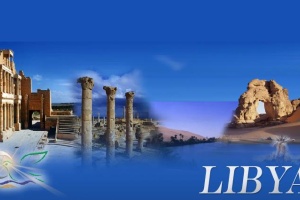Would it be convenient for Libyans to worry about a crumbling tourism industry when they have more pressing issues to fret over? Sounds like too much of a luxury in a country struggling to overcome armed conflict and instability.
Yet tourism, when translated into numbers, means external financial flows, one of the key factors for promoting economic growth, and that being said, a strong economy means a powerful state.
Many believe that a country like Libya with its array of landscapes and ecosystem if utilized properly would secure a decent living for its people far from oil.
The tourism sector incorporates many industries and depends heavily on the human factor, thus meaning lower unemployment rates, one of the main challenges facing young people.
When mentioning Libya, most people think of the Sahara Desert, which offers the ultimate in adventure travel, especially for western tourists desperate for a change from the city life. Yet, the Northern African country has much more to offer.
It embraces coastal areas, mountains, fertile grasslands, forests, historical and religious sites, tradition, and culture, besides mysterious locations that have kept historians guessing for centuries, like Kahf of Jin in Ghat and Waw an Namus.
The country situated on the southern bank of the Mediterranean is also home to the largest collection of Roman ruins outside the Italian peninsula, in addition to the Greek ruins of Cyrene in the East and the Ottoman heritage, which architecture is still evident in mosques, schools, and traditional markets, including the famous Souq al-Mushir in Tripoli.
Libya's variety of landscapes is matched by its range of climates that suit almost every taste. To the north of the country stretch countless beautiful beaches and a more Mediterranean climate.
Its geographical location makes it one of the major tourist attractions in the region, as it is located on the southern bank of the Mediterranean, facing the European countries a dominant source of tourists to Africa... So what is the problem with the tourism industry in Libya?
Adel Aoun, an expert in tourism operations and former director of the tourist villages of Ras Al-Hilal and Sousse, says that the lack of accommodation services heads the "lengthy list" of obstacles.
"The number of hotel beds does not exceed one thousand across Libya, and there is no dessert tourism or what is known as adventure travel, as most of the tourist arrivals were researchers or archaeologists. Tourist trips are more than eying an archaeological site; It needs luxury support, such as resorts, parks, cafes, and markets,” Aoun tells The Libya Observer.
The UN embargo imposed on Libya in the 1990s was also a major deterrent for tourists, according to Aoun.
"Marketing and tourism contracts were organized and concluded outside the country, in addition to the fact that flights were operated through Tunisia, making it more difficult for tourists, who had to travel by road and cross the Tunisia-Libya land border."
Even before the 17 February Revolution in 2011 that took the country on a path of conflict and instability, tourism was not very developed.
Observers believe that tourism during the era of late Muammar Gaddafi was merely a tool to polish his image in the western world, and some who worked in this sector under the former regime confirmed that the authorities imposed security restrictions on tourism companies and obliged them to conduct tours under the supervision of the tourist police or security forces.
Aoun, who participated in chalking the five-year plan for development in 1996, said that the program was a success if it was to be translated on the ground, but it remained “dead letter" without work or achievement.
Meanwhile, Tariq Al-Huni, Director of the Information Office of the Ministry of Tourism and Handicrafts, indicated in statements to The Libya Observer that Libya was included in the "Travel and Tourism Competitiveness Index" for the first time in 2009, after a visit by a representative from the World Tourism Organization at the time.
He confirmed that there are still several problems the tourism industry has to deal with, among them the administrative complications facing investment, the absence of appropriate infrastructure, and the lack of sufficient accommodation.
According to Al-Huni, the number of tourist arrivals presently does not exceed sixty or seventy thousand per annum.
Upon taking office last March, the Government of National Unity announced structural changes to the Tourism Ministry that included merging the Tourism and Traditional Industries sectors to become the Ministry of Tourism and Handicrafts.
The new ministry said it would focus on building human capacities, adopting development programs to develop the tourism industry, exchanging experiences with distinguished countries in this field, and encouraging investors to localize tourism projects in the targeted areas.



